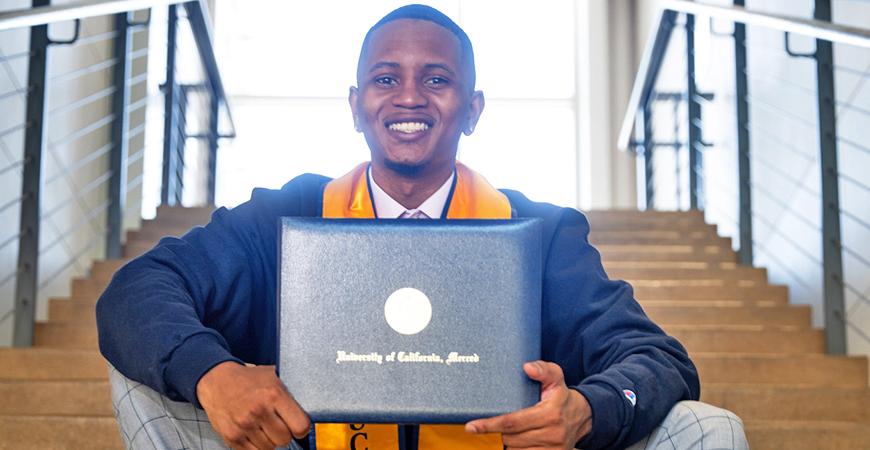
While growing up in the Sacramento area, Donald Carter ('21) said he didn't see many people who looked like him pursuing higher education. As the oldest of four boys in a single-parent household, he spent most of his time setting examples instead of learning from them.
But after graduating from John F. Kennedy High School and deciding to attend UC Merced, Carter realized he could use his experiences to guide other students who may have had similar upbringings.
His mentoring nature is even more prominent now as he works as a college guidance specialist with a nonprofit organization.
In high school, Carter was active inside and outside the classroom. Athletics were a major part of his life given that he played football, baseball and basketball.
"Around my senior year when I realized I wasn't going pro and that wasn't my journey, I heavily leaned on my academics," he said. "My grades were relatively high even though I transferred high schools."
A high GPA, hunger for knowledge and his mother were catalysts for him to apply to a four-year university.
"My mom is definitely one of my biggest supporters," he said. "She told me, 'Apply for the skies. You'll never know unless you apply.'"
Ultimately, UC Merced's being part of the prestigious UC system, its financial aid package and proximity to his hometown won him over.
Carter said he knew he belonged at UC Merced as soon as he first stepped foot on campus at orientation. He met students who genuinely wanted to be there and succeed — just like he did.
During that initial visit, he came across Afrikans for Retention and Outreach (AFRO) Hall, a living-learning community that welcomes first- and second-year students who are interested in exploring their African and Black identities. The program provides opportunities for networking, mentorship, community engagement and academic support.
"I knew I wanted to sign up for AFRO Hall on the spot," he said. "Being in that living-learning community changed everything. It helped me acclimate a lot faster and it helped me find resources."
As time went on, he became more involved with other groups and organizations, including the Black Student Union and the Willie Lewis Brown Jr. Youth Leadership Development Program, nicknamed the Brown Youth Academy. He was among several people who supported the fraternity and sorority expansion process and advocated for the Divine 9/National Pan-Hellenic Council organizations to establish a chapter at UC Merced.
Carter also had the opportunity to network and build lasting relationships with faculty and staff, including management Professor Mark Harris and his wife, Mari, director of education programs with UC Merced Extension.
"They became like my college parents — the people I went to for advice. They were the ones I took classes with or went to events with," he said. "To be around them imparting this wisdom and believing in me, it changed the motor in me, and it changed the belief in me. I started feeling like it wasn't imposter syndrome anymore; I thought I can really be here and succeed."
Throughout his entire university career, Carter knew he wanted to continue to be a role model for his siblings, especially because he needed more mentorship himself when he was their age.
"For me it was all about setting that example, trying to let my three younger brothers know that regardless of what circumstances you come from, whatever issues you deal with, you can change your life in a matter of four years by going to college," he said. "That was always in the back of my mind on why I went and why I tried to really push myself to succeed in that space."
Carter originally majored in psychology but changed to sociology. He was supposed to study abroad in Barbados, but the coronavirus hit. Like many, he used the pandemic to his advantage.
"Once COVID-19 happened, I was stuck inside, surrounded by four walls," he said. "I was already taking a lot of ethnic studies classes, so I decided to double major in sociology and critical race and ethnic studies."
Carter said he is now able to be a resource for others, thanks in part to the opportunities and even the challenges he experienced at UC Merced. He has embarked on a career where he can be a spokesperson and role model for youth who might need direction.
It was really thanks to all my involvement at UC Merced that allowed me to build this confidence to see myself as somebody who can be successful during and after college, and help others be successful too.
As a college guidance specialist with United College Action Network (U-CAN), he focuses on African American youth to help increase their college-going rate, get them accepted into Historically Black Colleges and Universities (HBCUs), and more.
"I can't tell them what to do but I can tell them about my experiences so when they decide to go to college, they're a bit more prepared than I was," he said. "I want them to have more options."
U-CAN is sometimes the first connection its participants have with colleges and universities. Carter has traveled with students to college fairs across California and to Las Vegas, where they connect with recruiters from HBCUs and can even get accepted into schools on the spot.
When he's not at U-CAN, Carter is working on his master's degree in higher education, leadership and policy studies at Sacramento State. His goal is to work at a higher education institution to continue paying it forward.
"I do the nonprofit work and am enrolled in graduate school so I can be that same professor, believer and supporter that I got through the Black faculty, staff and organizations at UC Merced," he said.






